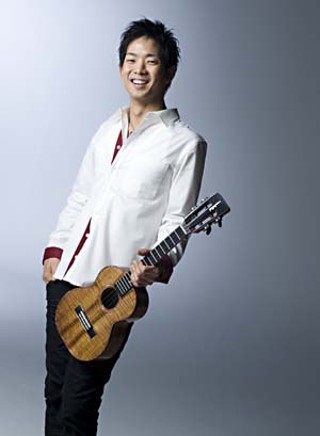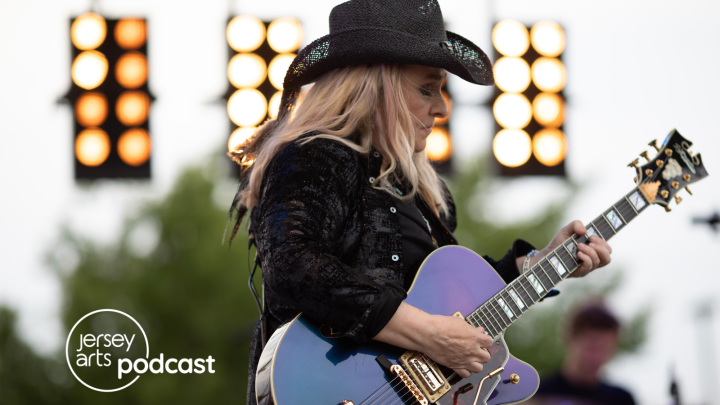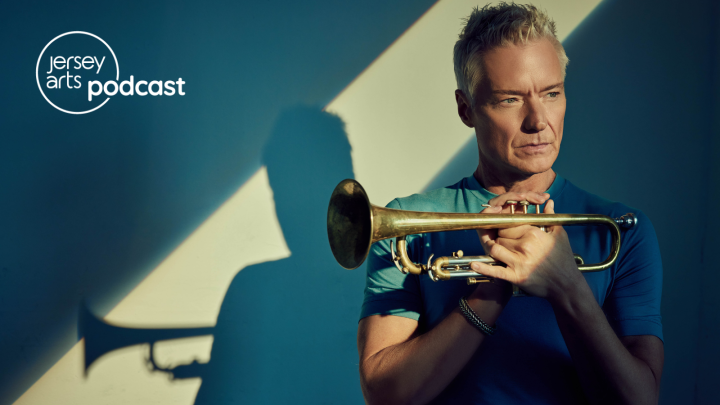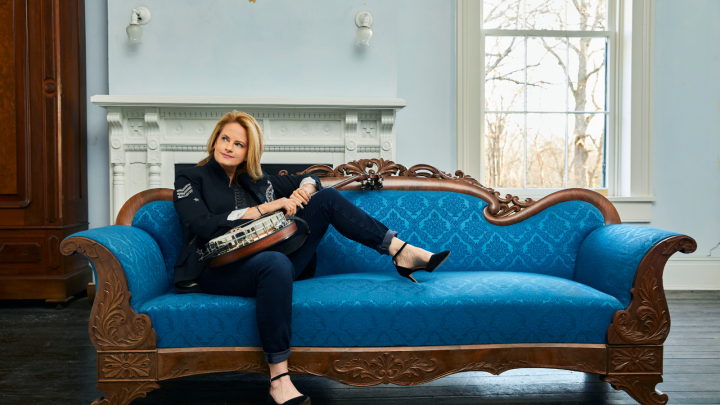Jake Shimabukuro, Ukelele Superstar

If you’re a fan of YouTube, chances are you’ve stumbled upon a video of Jake Shimabukuro playing ukelele in Central Park. A video of the Hawaiian’s cover of “While My Guitar Gently Weeps” became one of the first videos to go viral in YouTube’s history. It currently has been watched over 10 million times.
The success of that video led Jake to introduce the ukelele to audiences around the world. The ukelele master has three performances in New Jersey in April.
April 14 -- New Jersey Performing Arts Center in Newark (two performances: shows at 6pm and 8:30pm) April 15 -- Dennis Flyer Theater in Blackwood (show at 7:30pm)
Jersey Arts had the opportunity to speak with Jake via phone in-between shows.

Jersey Arts: You’ve got a couple of dates in New Jersey this month?
Jake Shimabukuro: I’m looking forward to them. I know some people there because I’ve been to New Jersey a couple of times and they’re like, “have you ever had the rolled pork?”
JA: The what?
JS: Maybe they said pork roll.
JA: Oh, yeah, pork roll... Pork roll and cheese is like our official diet around here. Rolled pork sounds like something you’ve hit with a car!
JS: I haven’t had it yet and my friends say if you haven’t had it than you haven’t been to Jersey. So I have to try it next time I go.
JA: Well, I know you’re a YouTube star, but are you hooked on the site as well?
JS: Oh definitely! When my video of “When My Guitar Gently Weeps” went viral on YouTube, it was around the time the website had just started so I wasn’t too familiar with the site. But once I got to know it, I became a huge fan as well. It’s amazing what is there. I can spend hours just looking up other artists and checking out other players. I can’t tell you how many wonderful musicians I’ve discovered through YouTube that I would not have been able to hear of through any other means. It’s been inspirational; it’s been fantastic; and it really single-handedly changed my life. We wouldn’t be speaking on the phone if it weren’t for YouTube.
JA: Isn’t it amazing to think that your video has had over 10 million views? Does that just blow your mind?
JS: It does. It really blows my mind. I’m so thankful and grateful to all those people who have seen the video and who emailed it to their friends. Because of them I get to tour all over the world and get to show my passion to people. It’s amazing and it’s just been a dream come true. I tell people when I was a kid growing up in Hawaii there was no such thing as a touring solo ukelele player. So, this is very exciting. It’s all new to me and I’m enjoying every moment.
It’s one thing if you have a million views but it really depends on who it is. This video went viral within the music industry -- music producers, songwriters, music promoters, other musicians. I got introduced to people like Jimmy Buffet, Bette Midler, Yo Yo Ma, and Bela Fleck and the Flecktones, all through YouTube. And I’m so thrilled that it was a George Harrison song because George Harrison is one of my heroes. He loved the ukelele.
JA: When you cover a song, how does the song change for you? I saw a video of you covering “Time After Time” and you could almost hear the vocals from the way you play that tune.
JS: Oh, thank you very much. Gosh, I don’t know. I don’t even know how I come up with the arrangements for the songs. A lot of times, the songs that I cover are tunes that are very dear to me. When you cover the song of another artist, it’s like wearing your favorite basketball player’s jersey. It’s just a celebration and an announcement of your love and appreciation for this incredible athlete or artist or human being.
Covering a song like “While My Guitar Gently Weeps” or Queen’s “Bohemian Rhapsody” or Cyndi Lauper’s “Time After Time” is really just an expression of my appreciation for their music; much more so that just capturing the technical side of things like the chords and the notes. To me, the greater picture is capturing the emotion behind the piece, connecting with the emotional bond that you have with the song.
When I hear a song like Leonard Cohen’s “Hallelujah”, it just tugs at my heart. When I was a kid listening to that song -- whether it was the Leonard Cohen original version or Jeff Buckley’s -- I would put that song on and just close my eyes, and it was like the whole world stopped.
So, when I’m covering a song and I’m up there smiling or just being in the moment, it’s because I honestly love that tune. And just being able to play it on an instrument and express it to an audience is really something not to take for granted. I really appreciate it. I think I love it just as much if not more playing it than people probably do listening to it!
JA: You’re known as such a ukelele virtuoso. How does it feel to be compared to artists like Eric Clapton and Jimi Hendrix?
JS: It’s such an honor. For me, Jimi’s the man! He was everyone’s hero if you played a string instrument or guitar. I just don’t know what to say to comments like that because it’s a huge honor for me, but sometimes I think I’m kind of glad Jimi hasn’t heard those comments yet!
JA: Well, those comparisons may seem awkward to you, but before you came along I don’t recall seeing anybody use expressions like “shredding on a uke”. I think that’s a different level you may have played a major role in taking the instrument.
JS: I tell people the story that when I was a kid I started out playing traditional Hawaiian music in Hawaii. But somewhere down the line I watched some rock concerts. I remember watching a Van Halen concert with the guys running all over the stage having so much fun. They were yelling and screaming and the energy was so intense! As a kid I remember thinking to myself, “That’s what a ukelele concert should be like!” It should have that kind of energy -- people in the audience yelling and screaming. That’s what I always envisioned, but how do you get there? To do that, I realized you have to put just as much energy into the music that you want to come out of it. So, when I get up on stage, it’s almost like game time for a sport. It’s like, “Alright, let’s do it!” All that time you spent in your bedroom practicing and rehearsing... it’s like throw all that out the window! Get up on stage and just play your heart out! And that’s what I enjoy doing. It’s such a thrill and so exciting to run out on stage and just launch into a song... to connect with an audience and just have fun.
The cool thing about the ukelele is that there are no egos when playing this instrument. It’s the ukelele and it’s fun. Most people don’t even see it as a real instrument, which is something I embrace. I love the fact that people aren’t intimidated by the ukelele. I feel that music should be for everyone -- no one should feel that they can’t play an instrument. I know it can be quite intimidating for people to pick up the violin or the piano or the cello, but for some reason people aren’t afraid to play a few chords on the ukelele. My grandmother is 80 years old and never played an instrument before, but her girlfriends and her were like, “let’s take this ukelele class.” So they all went together and in a couple of weeks they’re playing dozens of songs and they love it! It really is a beautiful vehicle to express yourself or just to use as therapy.
JA: Do you ever wonder if you didn’t grow up in Hawaii where ukelele is so popular if you would have been drawn to the instrument?
JS: To be honest, if I didn’t grow up in Hawaii I don’t know if I’d be playing the ukelele today. My mom played the ukelele, but had we been a family from the States I don’t know if I would have taken it up.
JA: On a national level, there are many mainstream musicians playing the ukelele these days. What does it feel like for you when you hear rock musicians like Eddie Vedder play the uke?
JS: I love it. I mean that Eddie Vedder record is one of my favorite albums. Just being able to hear this instrument that I’ve known my whole life and that I love... to hear it with that iconic voice, I mean Eddie Vedder! He’s not holding back on the vocals and he’s just wailing on the ukelele! It’s just magical for me. It’s like two things that you love -- you’re a big fan of Pearl Jam and love Eddie Vedder’s voice and you love the ukelele... you put the two together and it’s like oh my goodness!
JA: How does it feel to be so associated with the ukelele and see the resurgence in the instrument with more and more stores selling the instrument and mainstream artists playing them? You’re a big part of the resurgence.
JS: It’s an honor. I don’t claim any credit for anything. I really feel that the ukelele has truly been growing in popularity because of things like the Internet and YouTube and famous artists from other genres picking it up, playing it, and making it cool. When Eddie Vedder plays ukelele it becomes cool! Train, with “Hey, Soul Sister” introduced the instrument to a completely new audience. Many people didn’t even realize they were listening to a ukelele until much later and that song went straight up to number one. It was the number one song in the country for a number of weeks. I think it was the first time in history that a number one pop song on the radio had ukelele used in that way.
JA: Used not as a novelty, but as the main instrument?
JS: Exactly! I appreciated that so much. When I first heard that song I jumped out of my seat I was so excited!
JA: Is there anything like a ukelele jam at the end of the show?
JS: Well, a lot of people bring their ukeleles to the show and after the concert I usually go out to the lobby for a meet and greet. I’ll sign CDs and ukeleles and other things. A lot of times the lines are quite long. Sometimes we’re signing for almost two hours! But I like doing that because everyone has their ukeleles and they’ll have these jam sessions while they’re in line or are waiting. So, we have live music playing in the lobby while I’m signing, which is very cool.
JA: Final question, your bio lists two rather interesting people as major influences in your career and these aren’t the names I normally come across. You list Bruce Lee and Bill Cosby as influences. Can you tell me how those two helped form the artist you are today?
JS: Well with Bruce Lee it was basically his whole philosophy towards martial arts. I was a huge fan growing up. His whole thing was about embracing all different styles of martial arts. He was preaching mixed martial arts thirty years ago, maybe even before then. I remember as a kid just realizing that all these different forms of martial arts are all like different genres of music. I remember thinking that if Bruce Lee played the ukelele what would his approach be? That’s kind of what started this whole thing for me. I just realized its all music. He believes martial arts is just a form of human expression and I believe music is just a form of human expression. It’s all about expressing yourself honestly and that’s basically the foundation of my whole approach to playing the ukelele.
And Bill Cosby was a huge influence because he has an amazing ability to connect with an audience. When he’s on stage and he’s talking or even on the Cosby Show you get the sense that he’s just being who he is. He’s not trying to be anyone else, he’s expressing himself honestly. One of the most incredible stand-up comedy performances was Bill Cosby doing that HBO special called “Bill Cosby: Himself”. When he’s up there telling stories, it’s just so inspiring to me. I thought that when I get up on stage that’s what I want to do. I just want to be myself, have fun, not worry about this or that or be something that I’m not, but just get up on stage and try to connect with an audience. Bill Cosby was a huge influence in that way.



